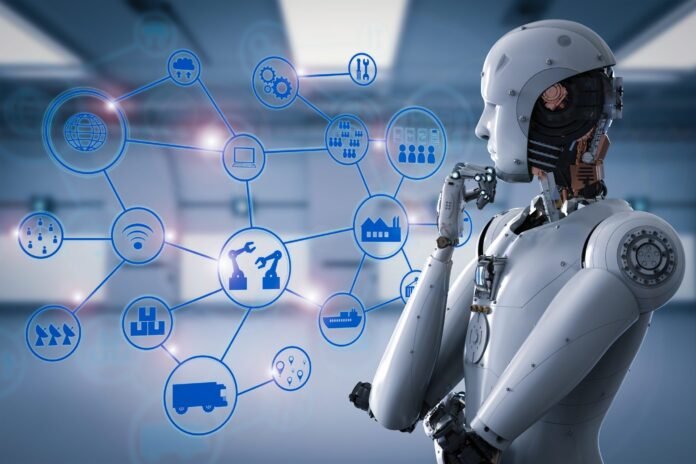Artificial intelligence (AI) is rapidly transforming the way we live and work. AI technology is being used to automate tasks, improve efficiency, and drive innovation in a wide range of industries. However, there are concerns that AI may also lead to job losses and changes in the nature of work. In this article, we will explore how AI is transforming industries and the future of work.
The Role of AI in Industry
AI is being used to transform a wide range of industries. Here are some examples:
-
Healthcare
AI is being used in healthcare to improve patient outcomes, reduce costs, and increase efficiency. AI technology is being used to analyze medical images, identify disease patterns, and develop personalized treatment plans. AI is also being used to monitor patients remotely, using sensors and wearable devices.
-
Manufacturing
AI is being used in manufacturing to improve efficiency, reduce costs, and increase productivity. AI technology is being used to automate tasks such as assembly, quality control, and logistics. AI is also being used to improve supply chain management and optimize production processes.
-
Finance
AI is being used in finance to improve risk management, fraud detection, and customer service. AI technology is being used to analyze financial data, identify patterns, and develop predictive models. AI is also being used to automate tasks such as customer service and underwriting.
-
Retail
AI is being used in retail to improve customer experience, reduce costs, and increase sales. AI technology is being used to analyze customer data, develop personalized recommendations, and optimize pricing strategies. AI is also being used to automate tasks such as inventory management and supply chain optimization.
-
Agriculture
AI is being used in agriculture to improve crop yields, reduce costs, and increase sustainability. AI technology is being used to analyze soil data, develop precision agriculture techniques, and optimize irrigation and fertilizer usage. AI is also being used to automate tasks such as crop monitoring and harvesting.
The Future of Work in the Age of AI
The rise of AI technology is changing the nature of work. Here are some ways in which AI is transforming the future of work:
-
Automation
AI technology is being used to automate tasks that were previously done by humans. This includes tasks such as data entry, customer service, and manufacturing. While automation can improve efficiency and reduce costs, it can also lead to job losses and changes in the nature of work.
-
Augmentation
AI technology is being used to augment human capabilities. This includes tasks such as decision-making, problem-solving, and creativity. Augmentation can improve efficiency and productivity, while also providing new opportunities for workers to develop skills and advance their careers.
-
New Jobs
AI technology is also creating new jobs. These include jobs such as data analysts, AI engineers, and machine learning specialists. These jobs require new skills and education, and provide opportunities for workers to develop new careers.
-
Skills Gap
The rise of AI technology is also creating a skills gap. Many workers may not have the skills and education needed to work with AI technology. This can lead to job losses and a mismatch between the skills needed by employers and the skills possessed by workers.
-
Human-Machine Collaboration
The future of work in the age of AI will involve collaboration between humans and machines. Workers will need to develop new skills and ways of working in order to collaborate effectively with AI technology. This will require new approaches to education and training.
Conclusion
AI technology is transforming industries and the future of work. AI is being used to automate tasks, augment human capabilities, create new jobs, and drive innovation. However, the rise of AI technology is also creating challenges, such as job losses, a skills gap, and the need for new approaches to education and training.
To prepare for the future of work in the age of AI, workers and organizations will need to adapt and embrace new ways of working. This includes developing new skills and education, investing in training and development programs, and adopting new approaches to collaboration and communication.
The benefits of AI are clear, from improving efficiency and productivity to driving innovation and growth. However, it is important to consider the potential negative impacts of AI on employment and the workforce. Organizations and policymakers must work together to ensure that the benefits of AI are balanced with the needs of workers and the broader economy.
In conclusion, AI technology is transforming industries and the future of work, and it will continue to do so in the years to come. By embracing new technologies and ways of working, workers and organizations can stay competitive and thrive in the age of AI. However, it is important to consider the potential impact on the workforce and work together to create a future that benefits everyone.
Google News | Telegram
















